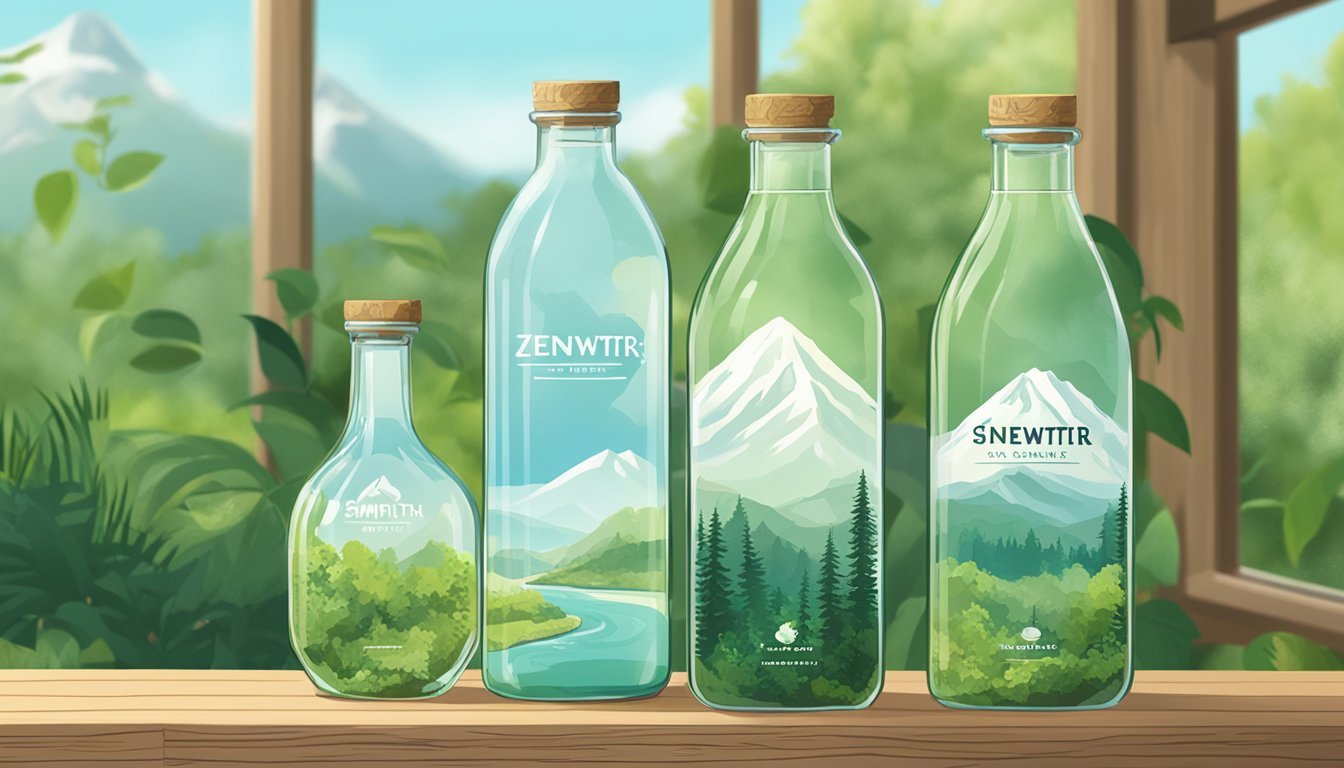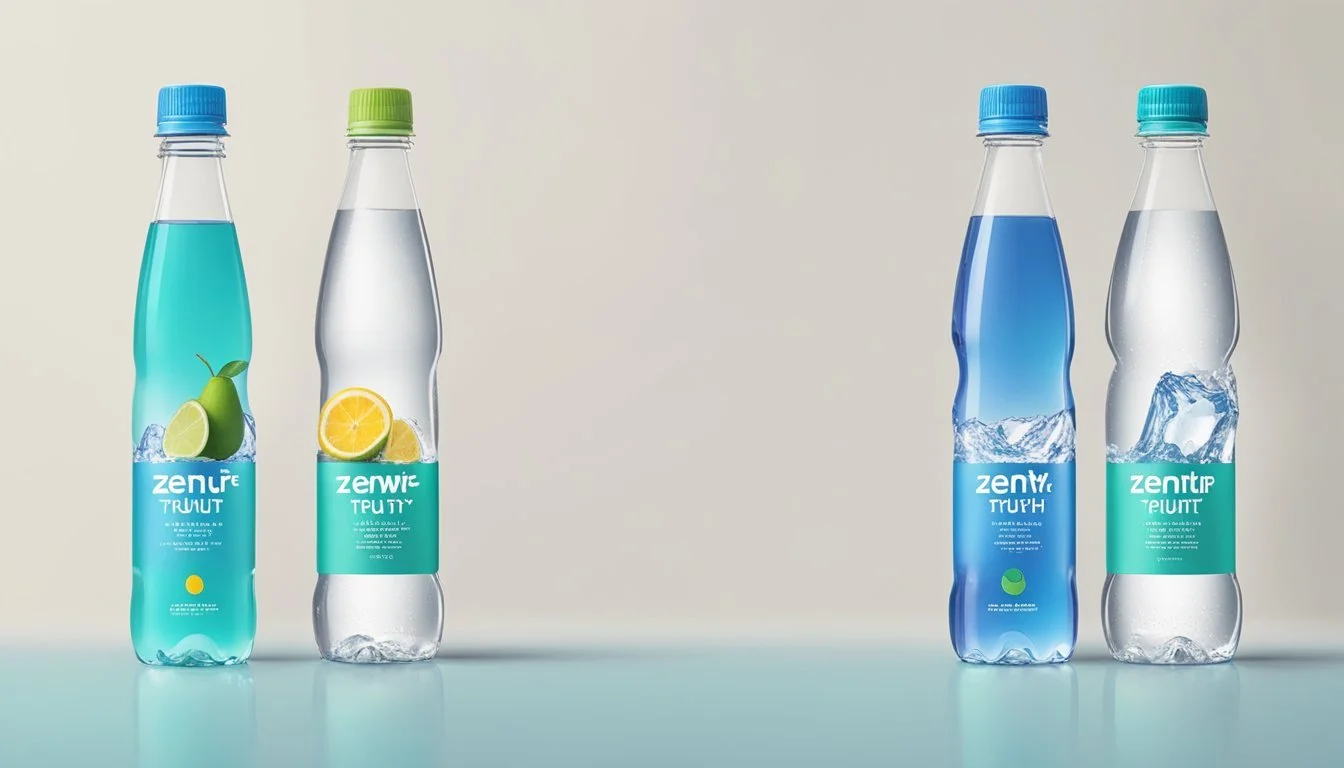Simple Truth vs. Zenwtr
Comparing Top Bottled Waters
When choosing between Simple Truth and ZenWTR bottled water, consumers often look at factors such as taste, source, and sustainability. ZenWTR stands out for its commitment to environmental sustainability by using 100% recycled ocean-bound plastic for its bottles, positioning itself as an eco-friendly alternative. Conversely, Simple Truth spring water, sourced from Michigan, offers a distinct flavor profile with a subtle sweetness reminiscent of burned sugar.
Taste preferences often play a significant role in the decision-making process. Many find Simple Truth's spring water appealing due to its unique taste and hint of sweetness. ZenWTR, on the other hand, provides a higher pH level at 9.5, making it a favored choice among athletes and those seeking alkaline water benefits.
Ultimately, the choice between Simple Truth and ZenWTR depends on individual priorities—whether it's taste, environmental impact, or the specific benefits of alkaline water. Both brands cater to different aspects of consumer needs, ensuring that whatever the preference, there's a high-quality option available.
Understanding Bottled Water
Bottled water has become a staple for many, offering convenience and often perceived quality over tap water. It's essential to understand the factors behind its popularity and the various types available to make an informed choice.
The Rise of Bottled Water
The demand for bottled water surged in recent decades due to concerns over tap water quality and the convenience it offers. Bottled water is perceived as purer and safer, prompting its widespread consumption.
Advertising campaigns have also played a significant role in promoting bottled water as a healthier option. The ability to carry it anywhere has made it a preferred choice for active lifestyles and travel.
Types of Bottled Water
Bottled water comes in various forms, each with distinct characteristics.
Spring Water: Collected from natural springs, usually retains minerals and is typically not processed extensively.
Purified Water: Undergoes processes like reverse osmosis to remove impurities, often sourced from municipal supplies but treated to higher standards.
Alkaline Water: Has a higher pH than regular water, marketed for its potential health benefits like enhanced hydration and improved metabolism.
Different types of bottled water cater to varying preferences and needs, making it essential to choose one that aligns with personal health goals and environmental considerations.
Evaluating Brands: Simple Truth vs. Zenwtr
Simple Truth and ZenWtr are two distinct names in the bottled water market, each offering unique features and benefits. Below, we explore their brand attributes and how they stand in terms of market presence and popularity.
Brand Overview
Simple Truth is Kroger's line of natural and organic products, including bottled water. It focuses on providing accessible, eco-friendly options. Their water claims to offer natural, pure taste without additives.
ZenWtr distinguishes itself with high pH levels due to its alkaline nature, promoting potential health benefits. The brand emphasizes environmental responsibility by using bottles made from 100% recycled ocean-bound plastic.
Market Presence and Popularity
Simple Truth benefits from Kroger’s extensive retail network, ensuring wide availability. Its reputation for affordability and quality makes it a go-to choice for many health-conscious consumers.
ZenWtr, though newer, has swiftly gained attention. Reviews highlight its unique alkaline properties and recyclable packaging. Its premium positioning appeals to environmentally-focused individuals seeking alternatives to conventional bottled water.
Health and Hydration
Staying hydrated is essential for maintaining good health, and the quality of the water one drinks can impact overall well-being. Examining the health benefits of hydration and the role of alkalinity and pH levels can provide a clearer picture of the differences between Simple Truth and ZenWTR.
Health Benefits of Hydration
Hydration is crucial for various bodily functions. It aids in digestion, ensures proper circulation, and helps maintain body temperature. Drinking sufficient water can enhance energy levels and cognitive performance.
Simple Truth and ZenWTR both aim to provide optimal hydration. While Simple Truth focuses on offering clean, pure water, ZenWTR promotes its higher alkalinity as beneficial for active lifestyles.
Proper hydration also supports kidney function by helping to flush out toxins. Additionally, adequate water intake can improve skin health and elasticity, aiding in a more youthful appearance. Both brands contribute to these benefits, but ZenWTR's added minerals might offer a slight edge for those looking for more than just hydration.
Alkalinity and pH Level
The pH level of water indicates its acidity or alkalinity. A pH of 7 is neutral, and anything above is considered alkaline. ZenWTR has a pH level of 9.5, which means it is more alkaline compared to many other bottled waters.
Alkaline water is believed by some to help neutralize acid in the bloodstream and improve metabolism. It may also aid in nutrient absorption and reduce acid reflux. ZenWTR’s high pH level positions it as a premium choice for those engaging in regular physical activity.
Simple Truth does not emphasize a high pH level, offering a more neutral option. This can be suitable for general hydration needs without the additional focus on alkalinity.
Both brands provide essential hydration, but the choice between them may come down to how much one values the potential benefits of increased alkalinity in their water.
Environmental Impact
Examining the environmental impact of Simple Truth and ZenWTR reveals crucial differences in their approaches to sustainability and eco-friendliness. Both brands emphasize their commitment to reducing plastic pollution and promoting recycling.
Ocean-Bound Plastic and Recycling
ZenWTR sets itself apart with its innovative use of ocean-bound plastic. The company produces bottles made from 100% recycled ocean-bound plastic, making a notable effort to combat marine pollution. This initiative aligns with increasing consumer demand for environmentally friendly products.
In contrast, Simple Truth's environmental strategy focuses on using recycled materials, though it does not specify ocean-bound plastic. Their bottles are made from a significant percentage of post-consumer recycled plastic. This approach supports recycling but may not directly address ocean plastic pollution as effectively as ZenWTR.
ZenWTR's unique selling point is its commitment to sourcing plastic that would otherwise end up in the ocean. This proactive step helps reduce the overall plastic footprint in marine environments. Simple Truth’s approach, while still beneficial, may not have the same direct impact on ocean ecosystems.
The Cost of Convenience
Convenience often comes with environmental costs that are important to consider. ZenWTR offers a range of bottle sizes, appealing to various consumer preferences, yet always maintains its eco-friendly ethos with recycled ocean-bound plastic. This makes ZenWTR an attractive choice for eco-conscious consumers seeking convenience without compromising on sustainability.
Simple Truth also offers various bottle sizes and packaging options. While their use of recycled materials helps mitigate environmental impacts, the lack of a specific focus on ocean-bound plastic could be seen as a missed opportunity in the fight against ocean pollution.
The convenience offered by both brands supports consumer lifestyles, but the environmental costs vary. ZenWTR's focus on ocean preservation provides a clear advantage in terms of eco-friendliness. Simple Truth, although environmentally mindful, has room to enhance its strategies to match ZenWTR's innovative approach to reducing ocean plastic pollution.
Water Quality and Purity
When assessing bottled water, water quality and purity are crucial metrics. The two main factors to consider are the rigor of the filtration and purification processes, and the levels of contaminants present in the final product.
Filtration and Purification Processes
ZenWTR employs an advanced filtration process, including reverse osmosis, which thoroughly removes impurities. Additionally, ZenWTR has a natural alkalinity with a pH of 9.5, providing slightly alkaline water that may offer certain health benefits. The meticulous nature of ZenWTR's purification ensures high purity.
Simple Truth also focuses on rigorous purification, employing multiple stages of filtration. This brand typically uses a combination of carbon filtration and reverse osmosis to ensure the removal of contaminants. Simple Truth’s filtration aims to provide pure, clean, and safe drinking water.
Both brands utilize reverse osmosis as a primary purification method, ensuring the high-quality standards expected of premium bottled water.
Contaminant Levels and Safety
ZenWTR is noted for its high purity, with independent tests often showing low levels of harmful contaminants such as lead, arsenic, and mercury. This rigorous testing contributes to the brand's reputation for providing safe drinking water.
Simple Truth places a significant emphasis on safety with regular monitoring and testing. Consumer Reports have highlighted cases where bottled waters, including Simple Truth, have been scrutinized for contaminants like PFAS. However, Simple Truth’s adherence to strict safety protocols ensures it generally meets safety standards for low contaminant levels.
The safety of both brands is paramount, with both ZenWTR and Simple Truth adhering to stringent safety standards to ensure consumers receive clean, safe drinking water free from harmful contaminants.
Flavor and Taste Experience
In comparing Simple Truth and Zenwtr, understanding their flavor involves examining mineral content and personal taste preferences.
The Role of Mineral Content
Mineral content greatly influences the flavor of bottled water. Simple Truth typically contains essential minerals like calcium, magnesium, and sodium, which contribute to a balanced taste.
Zenwtr, known for its 9.5 pH alkalinity, has a distinct taste profile due to its high alkaline content. This alkalinity can impart a smoother, less acidic flavor, which some individuals might find appealing.
Zenwtr's purification process—including multistep filtration and reverse osmosis—also removes impurities and contributes to its unique taste. Comparing these waters illustrates how mineral composition shapes flavor, catering to different palate preferences.
Taste Testing and Preference
Taste tests reveal varying preferences based on individual palate and water sommelier feedback. Some prefer Simple Truth for its subtly mineralized taste and natural simplicity.
Others favor Zenwtr's ultra-pure, smooth flavor, enhanced by its high alkalinity. Athletes and fitness enthusiasts particularly appreciate Zenwtr for its refreshing taste post-workout.
It's essential to note personal preference plays a significant role. What appeals to one may not suit another. Water sommeliers often highlight Zenwtr's crispness, while Simple Truth is praised for its balanced, neutral flavor.
Ultimately, choosing between these brands depends on one's taste preference and desired hydrating experience.
Packaging and Design
The packaging and design of bottled water can heavily influence consumer choices, highlighting the importance of aesthetics and sustainability.
Bottle Design and Materials
Simple Truth uses recycled plastic, aiming to combine affordability with eco-friendliness. Their bottles are straightforward without much flair but focus on reducing environmental impact.
ZenWTR utilizes 100% ocean-bound recycled PET (rPET) plastic for its bottles, positioning itself as a sustainable option. ZenWTR is also introducing aluminum and glass bottles, offering consumers more choices. The brand emphasizes an ultramodern, sleek design that appeals to eco-conscious consumers.
Brand Materials Design Features Simple Truth Recycled Plastic Basic, cost-effective ZenWTR 100% Ocean-Bound rPET, Aluminum, Glass Modern, sleek, eco-friendly
The Impact of Packaging on Purchase Decisions
Consumers are increasingly conscious of their environmental impact and prefer brands that prioritize sustainable packaging.
Simple Truth attracts budget-conscious individuals who still want to support eco-friendly practices through simple yet effective designs using recycled materials.
ZenWTR targets those willing to pay a premium for new plastic production reduction. By using varied materials such as aluminum and glass, ZenWTR caters to consumers seeking both sustainability and style.
The brand’s mission and innovative materials resonate with eco-focused buyers, potentially driving higher sales. Pricing, visual appeal, and environmental impact all play crucial roles in influencing purchase decisions for both brands.
Cost and Accessibility
When considering bottled water options, cost and availability are key factors. Simple Truth and Zenwtr offer premium hydration solutions with varying price points and accessibility in both physical and online retail environments.
Price Comparison
Simple Truth water generally falls into a mid-range price category. At major grocery chains like Whole Foods and other stores, a pack of six 1-liter bottles typically costs around $5 to $6.
Zenwtr, known for its high alkalinity, commands a higher price. A similar pack often costs between $9 to $11, reflecting its premium positioning. The higher price tag is attributed to its specialized purification process and eco-friendly packaging.
Comparison Table:
Brand Price (per pack of 6) Simple Truth $5 - $6 Zenwtr $9 - $11
Availability in Stores and Online
Simple Truth water is widely available in grocery stores and supermarkets, including Whole Foods, Kroger, and other major retail chains. Consumers can easily find it in convenience stores as well. For online shoppers, this brand is commonly listed on platforms like Amazon and each store's e-commerce websites.
Zenwtr benefits from a more niche market placement. While not as ubiquitous in physical stores as Simple Truth, it is often found in specialty health stores and select grocery chains. Online, Zenwtr can be purchased through its official website and other retail platforms such as Amazon, making it accessible to a broader audience despite its specialized niche.
Brand Ethics and Commitments
ZenWTR and Simple Truth exhibit distinct approaches to corporate responsibility and customer relations. Both brands emphasize ocean conservation and responsible disposal, while also prioritizing customer trust and brand loyalty through various initiatives.
Corporate Responsibility and Ocean Conservation
ZenWTR is committed to ocean conservation and environmental protection. It uses 100% post-consumer recycled ocean-bound plastic for its bottles, highlighting its dedication to reducing marine pollution.
The company partners with organizations to support ocean cleanup projects and has pledged that 1% of sales go to conservation efforts. This proactive approach is aimed at preventing plastic waste from reaching oceans initially.
Simple Truth, part of the Kroger brand, also emphasizes sustainability. Their bottled water products often feature eco-friendly packaging, though not as extensively as ZenWTR's ocean-bound plastics. Simple Truth promotes responsible sourcing and encourages customers to practice responsible disposal of their products.
Customer Trust and Brand Loyalty
ZenWTR builds customer trust through its transparent and environmental-focused practices. By utilizing recycled materials and involving customers in its conservation mission, it fosters a sense of shared responsibility.
Their certifications and clear labeling on recycling information enhance credibility, encouraging customer loyalty.
Simple Truth leverages its association with the Kroger brand to gain customer trust. Their products undergo stringent quality checks and are often certified for various quality standards, assuring consumers of their reliability.
The brand also engages with its customers through loyalty programs and promotions, ensuring repeat purchases and brand loyalty. By aligning its practices with broader sustainability goals, it maintains a dependable image.









